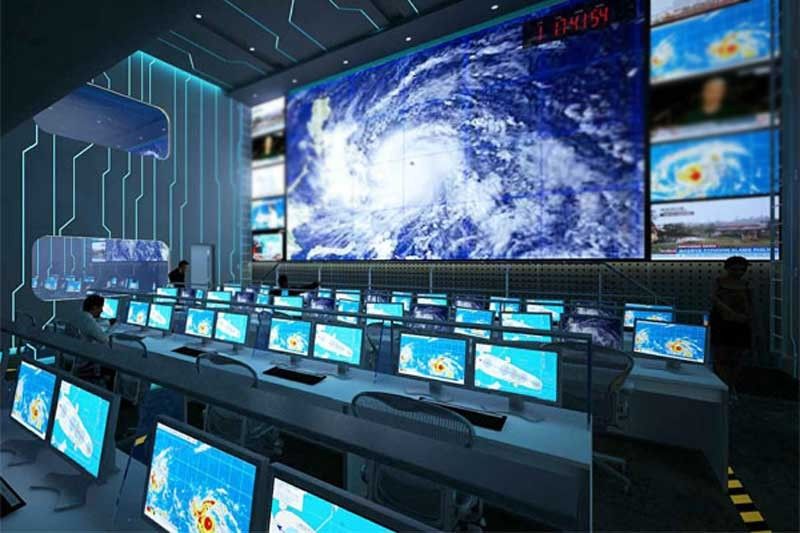Scientists oppose Pagasa, Phivolcs move to new department

MANILA, Philippines — Top government scientists have expressed opposition to the planned transfer of two attached agencies of the Department of Science and Technology (DOST) to the proposed Department of Disaster Management (DDM).
The proposed Department of Disaster Management will have jurisdiction over the Philippine Institute of Volcanology and Seismology (Phivolcs) and the Philippine Atmospheric, Geophysical and Astronomical Services Administration (PAGASA).
Currently, the two are attached agencies of the DOST.
Science Secretary Fortunato dela Peña earlier said he was not in favor of placing PAGASA and Phivolcs under DDM’s jurisdiction.
Renato Solidum Jr., DOST undersecretary for Disaster Risk Reduction and Climate Change, echoed Dela Peña’s position that Phivolcs and PAGASA are focused on research and development and thus should be kept in a science and technology environment. Solidum also heads Phivolcs.
“Our activities are all related to S&T... Essentially, the S&T component of our work would be best served or best executed under the S&T agenda, and under a science and technology culture,” Solidum said.
“Both PAGASA and Phivolcs are agencies which employ a lot of R&D to improve various services such as providing information and warning and guidance so that the understanding of risk will be clearly understood,” Solidum explained.
“When it comes to disaster resiliency, after understanding the risks, the issue will then be, how do you manage the risks so that potential losses will be prevented and reduced, as well as recovery and planning,” he added.
“But DOST will provide all the information under Phivolcs and PAGASA,” he said, referring to the current setup.
“If you look at other countries, hiwalay din yung (there are separate) monitoring and warning research organizations to their disaster management departments,” he pointed out.
William Padolina, past president of the DOST–National Academy of Science and Technology (DOST-NAST), has also expressed concern over the proposal to detach Phivolcs and PAGASA from the DOST.
The DOST-NAST is the country’s highest advisory and recognition body for science and technology.
“My only concern is what or how the transfer will affect the R&D programs of Phivolcs and PAGASA. You see, they have a lot of research programs,” Padolina told The STAR.
He said the proposed DDM is intended as an operational department and putting the two S&T agencies under it could make them second-class units.
“I’m afraid that the R&D activities will take second place or will be of lower priority,” he said.
“If the transfer to an operating department is going to affect the R&D, then I think it will not be good for PAGASA and Phivolcs,” Padolina said. “These R&D activities are long term investments,” Padolina pointed out.
Retired corporate executive Filemon Berba Jr., president of the Philippine Foundation for Science and Technology, said the plan to put Phivolcs and PAGASA under a department of disaster management is “completely outrageous.”
“The DOST is an S&T agency, the lead S&T organization of the country,” Berba said. Being S&T agencies, Phivolcs and PAGASA have to be under the DOST, he said.
Berba said the proposed disaster management department is not meant as a science organization but a management organization “that responds when there is a crisis.”
Berba is one of the founders of the Philippine Quality and Productivity Movement and has been very active in organizations and foundations involved in science and technology, and in industry-academe linkages.
“It’s a management thing. They don’t need scientists there. The DOST needs the scientists, PAGASA needs the scientists, Phivolcs needs the scientists,” he said.
“What they should do there (DDM) is put good managers, good management people who can manage crisis, anticipate crisis. That crisis response organization should take care even of possible nuclear crisis, or such potential disasters,” he said. “DOST, Phivolcs, PAGASA, you need more scientists there. The critical requirement for PAGASA and Phivolcs are good scientists,” he pointed out.
“Many scientists are not good managers but they are good scientists. But a good manager is not necessarily good in science,” he said.
Meanwhile, the Catholic Bishops’ Conference of the Philippines-National Secretariat for Social Action (CBCP-NASSA) is calling for the creation of a similar government agency, which it calls Department of Disaster Risk Reduction (DDRR), citing the country’s vulnerability to natural disasters.
In a statement, CBCP-NASSA executive secretary Fr. Edwin Gariguez said that recent flooding in the country has put the spotlight on the need for a government agency that would be focused on disaster mitigation, preparedness and prevention.
- Latest
- Trending




























